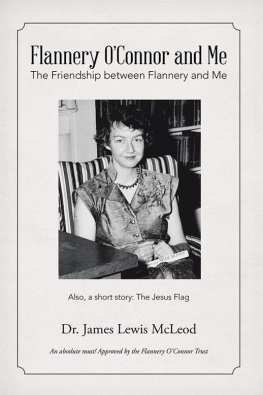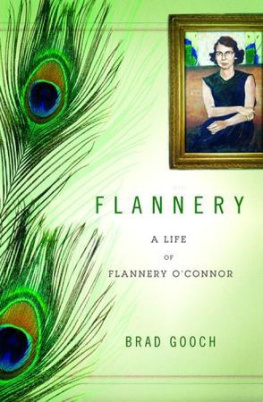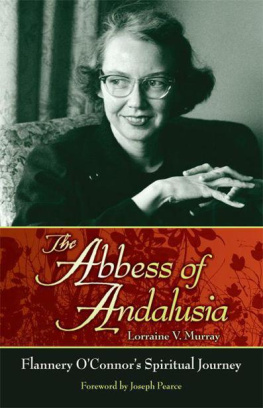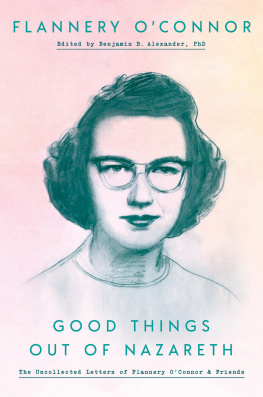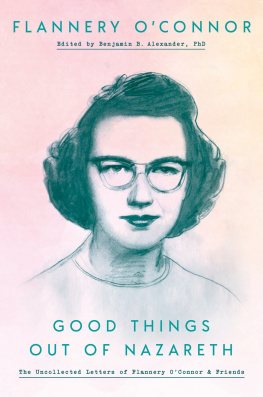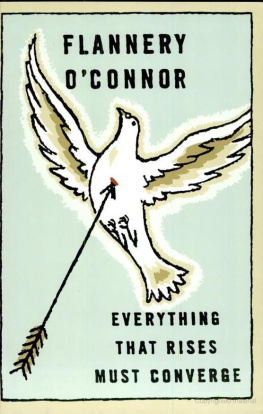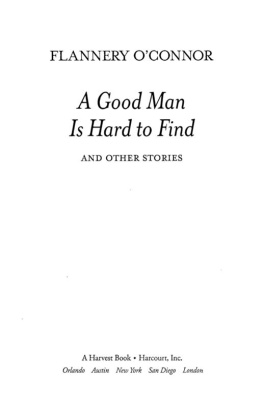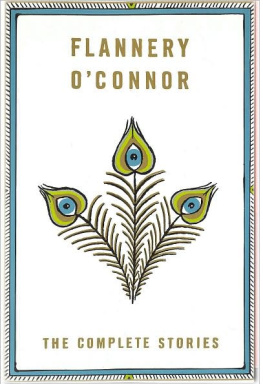
The author and publisher have provided this e-book to you for your personal use only. You may not make this e-book publicly available in any way. Copyright infringement is against the law. If you believe the copy of this e-book you are reading infringes on the authors copyright, please notify the publisher at: us.macmillanusa.com/piracy.
Contents
To Regina Cline OConnor in gratitude for letting readers come to know her daughter better
Introduction
Among the papers in the Flannery OConnor Memorial Room of the library of her college, Georgia College, in Milledgeville, I came across a tiny, scrappy notebook, about three inches by four, kept by Flannery when she was twelve. It was scrappy in both senses of the word. On the first page a warning to snoopersI know some folks that dont mind thier own bisniscalled me to order and reminded me that it would be well to walk gingerly through her correspondence, bearing in mind what she herself would have objected to as a breach of privacy, particularly the privacy of her friends. No great loss, for there was something here of much greater interest. Reading through her letters, I felt her living presence in them. Their tone, their content, and even the number and range of those she corresponded with, revealed the vivid life in her, and much of the quality of a personality often badly guessed at.
Katherine Anne Porter wrote to Flannerys friends, the Gossetts, after they had taken her to lunch with Flannery and her mother at the farm, I am always astonished at Flannerys pictures which show nothing of her grace. She was very slender with beautiful, smooth feet and ankles; she had a fine, clear, rosy skin and beautiful eyes. I could wish I had some record of her as she appeared to me
Most of her friends wish the same thing, both literally and figuratively. But she was not photogenic in maturity, or at least the camera was often as unjust as what was written about her. I have come to think that the true likeness of Flannery OConnor will be painted by herself, a self-portrait in words, to be found in her letters. Read in sequencefrom the beginning in 1948, when she wrote asking Elizabeth McKee to become her literary agent, through to the last note of 1964 on her bedside table, waiting to be postedher letters sketch the lineaments, add the chiaroscuro of depth and space and the color of life itself. There she stands, to me, a phoenix risen from her own words: calm, slow, funny, courteous, both modest and very sure of herself, intense, sharply penetrating, devout but never pietistic, downright, occasionally fierce, and honest in a way that restores honor to the word. Perhaps because I remember her as smiling and laughing often when she was a part of our family in the Connecticut woods, her self-portrait wears, for me at least, a smile I recall very clearly. The mindless camera records on Flannerys face the ravages of ill health; her letters wipe them all away, not in a cosmetic sense, but by means of something that lay within and imparted the fine clarity and youthfulness Katherine Anne Porter perceived. And her offhand way of speaking of her physical ordeal, when she did, tells more about her gallantry than any encomium could make real.
Letters were always important to her. When she lived with us, she took a daily walk to the mailbox, half a mile away at the bottom of our ridge. One thing it always contained was a letter from Regina OConnor, who wrote to her, and to whom she wrote, every single day. This daily exchange of news and talk between them ought to be mentioned, just to keep the record straight, since none of those letters will appear in the collection. Flannery shared news items from Milledgeville with us, and we came to feel that we knew all her kin well, long before we met them. Her strong family feeling was manifest even then.
On the subject of Mrs. OConnor herself, I can report a remark that Flannery made to me the last time I talked to her. She told me that she had fully come to terms with her confinement, and with the physical danger in which she lived; that she had, in fact, only one great fearthat her mother would die before she did. I dont know, she said, what I would do without her. The letters themselves are full of Mrs. OConnor: she is quoted, referred to, relished and admired, joked with and about, altogether clearly loved.
What else, though, do the letters tell us of the storyteller herself? The overriding impression is of a joie de vivre, rooted in her talent and the possibilities of her work, which she correctly saw as compensating her fully for any deprivations she had to accept, and as offering her a scope for living that most of us never dream of encompassing. From this sensibility grew a wonderful appreciation of the worlds details: the vagaries of human personality; the rich flow of the language she heard around her; the beauty of Andalusia, the family farm outside Milledgeville where the OConnors went to live after Flannery fell ill, and of the birds, homely or regal, with which she peopled it; the hospitality she and her mother offered to friends and strangers alike; good food, always a pleasure to her; talk, books, and letters. These letters reveal her to have been anything but reclusive by inclination: to have been, on the contrary, notably gregarious. She enjoyed company and sought it, sending warm invitations to her old and new friends to come to Andalusia. Once her inviolable three-hour morning stint of writing was done, she looked for, and throve on, companionship. When people couldnt come, she wrote to them, and looked forward to hearing from them in return. She participated in the lives of her friends, interested herself in their work, their children, their health, and their adventures. Anything but dour, she never ceased to be amused, even in extremis. In a letter after her return from the hospital and surgery, in 1964, she wrote: One of my nurses was a dead ringer for Mrs. Turpin. Her Claud was named Otis. She told all the time about what a good nurse she was. Her favorite grammatical construction was it were. She said she treated everybody alike whether it were a person with money or a black nigger. She told me all about the low life in Wilkinson County. I seldom know in any given circumstances whether the Lord is giving me a reward or a punishment. She didnt know she was funny and it was agony to laugh and I reckon she increased my pain about 100%.
The world of the absurd delighted her. She regaled us with Hadacol advertisements; birth announcements of infants with names that had to be read to be believed; such news items as the attendance of Roy Rogers horse at a church service in California, or the award of first prize in an amateur contest to a crimped and beribboned seven-year-old singing A Good Man Is Hard to Find; and the wonderful mugs of a gospel quartet promised as a Coming Attraction somewhere. All these things filled her with glee, and gleefully she passed them on. She could write fine country talk, of course, and often did, to amuse her friends and herself. The next letter, however, might set forth in strong clear style a literary or theological insight that shed light in every direction. She was capable, at twenty-three, of flooring a patronizing publisher with one courteous but steely letter when he proposed to work with her to change the direction of her first book. He later complained in a note to her former teacher, Paul Engle, that she suffered from hardening of the arteries of cooperative sense, adding, It seems most unbecoming in one so young. But she escaped and went on to a publisher and to editors who were better able to recognize the originality of her gift and who encouraged her to develop in her own way.
However inordinate her self-confidence seemed, she never failed to send her manuscript drafts to those of her friends who she felt understood what she was trying to do, and whose literary judgment she respected. There is continual discussion of work-in-progress throughout the letters over the years, and she was always open to suggestion or instruction, and almost always acted upon any advice that helped her to improve a particular piece of writing. She had the true humility that is based on a just assessment of ones own worth. She certainly knew hers, and at the same time knew that it could always be increased by a willingness to learn. One thing she had little interest in learning, however, was how to spell. In the ragged little journal mentioned above, she complained, Teacher said I dident know how to spell what of it? Well, what of it? Possibly because her ear was so fine, it was enough for her to get things down more or less as they sounded. In any event, she was what she described as a very innocent speller. Except for obvious misslicks on the typewriter, I have retained her own versions of what words ought to look like; to have corrected them would have destroyed some of the savor of her letters.
Next page

